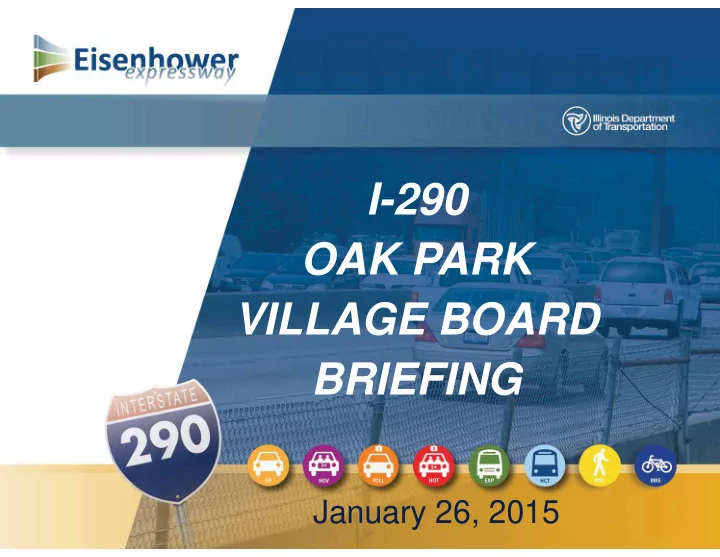

I-290 OAK PARK VILLAGE BOARD BRIEFING January 26, 2015 1
I-290 Planning Process & Schedule 2
I-290 Study Area Reconstruction Re-striping Section Section (9 miles) (4 miles) Circle Interchange Study Area � 13-mile study area � West of Mannheim Road to Racine Avenue � Connects between: I-88 on the west – Circle Interchange on the east – 3
Stakeholder Involvement � Context Sensitive Solutions – Considers safety, mobility, community and environmental factors � Stakeholders have helped to: – Define transportation needs – Identify constraints – Develop alternatives – Evaluate alternatives 4
I-290 Transportation Needs, Alternatives Summary Overall goal: Create an asset for adjoining communities � Transportation Needs Mobility, safety, condition and design – � Alternatives Additional lane within “trench” – Transit, bicycle, and pedestrian improvements – Level of detail increases as evaluation advances – � Environmental Considerations The communities make up the environment – Detailed engineering/traffic data required for noise, air, social, economic and – cultural analysis 5
Alternatives Carried Forward 6
Alternatives Carried Forward 7
Blue Line Extension Included in all alternatives: Extension to Mannheim – most • effective termini Initial service option – bus on inside • I-290 shoulder I-290 corridor improvements will • enable/leverage transit improvements Blue Line Extension Station Feeder/ Intersecting Bus Route P Station Park-and-Ride Facility 8
Bicycle and Pedestrian Amenities � Bicycle and pedestrian features (to date) – New east-west path from the Prairie Path to Columbus Park – Expanded sidewalks on all crossings – Pedestrian plazas at Harlem Avenue and Austin Boulevard – Safety features – ADA compliant design, improved lighting, pedestrian push buttons and countdown signals, high visibility crosswalks, safety islands � More coordination and analysis in Round 3 9
Alternatives Evaluation Round 3 Initial Findings � 25,000 to over 30,000 additional persons through the corridor each day on highway and transit � Up to 397,000 additional jobs accessible by highway and transit (within 60 minutes) � 56% to 59% peak period travel time savings on managed lanes � 24% to 52% travel time savings on general purpose lanes � Improves expressway safety up to 8% 10 10
Alternatives Evaluation Round 3 Round 3 Timeframe: January 2015 – August 2015 OBJECTIVE: Advance from 4 concepts to a Preferred Alternative � Summer 2014 – Fall 2015, multiple stakeholder meetings � Geometry (starting point for Round 3) � Drainage � Detailed environmental studies ...an excellent (and critical) ...an excellent (and critical) � Blue Line Vision Study results opportunity to shape the opportunity to shape the � Travel performance outcome of this planning outcome of this planning � Cost process process � Aesthetics � Intelligent Transportation Systems (ITS) � Project funding/financing � Construction staging scenarios � Sustainability 11
Round 3 – Village of Oak Park � Village comments – Technical studies – Meetings and workshops � Working group – Village participants – IDOT/CTA project team 12
CTA Blue Line Forest Park Branch Feasibility/Vision Study Recommendations 13
14 Purpose & Study Process 14
15 Study Area 15
Summary of Existing Conditions Assessment Minimal upgrades have been completed as needed Special Trackwork: crossovers & switches recently upgraded (except Lathrop) • Signals: recently upgraded • Remaining elements beyond useful life and severely worn Track: contaminated ballast, deteriorated ties, poor drainage, worn rail • Stations: over 50 years old, only 4 of 12 are accessible, narrow platforms • Structures: approaching end of useful life • Traction Power: substation, cabling, third rail, etc require upgrading • Communications System: warrants technical improvements • Maintenance Shop: approaching end of useful life; inadequate track • configuration and capacity 16 16
Overall Recommendations Complete reconstruction/modernization for the Forest Park branch • Maintain existing entrance locations • Improve customer experience • Improve infrastructure • Improve terminal site Maintain existing service Work with IDOT on corridor improvements 17 17
18 Maintain Existing Entrance Locations 18
Improve Customer Experience: Conceptual Rendering 19 19 19
Improve Customer Experience: Conceptual Rendering 20 20 20
21 Improve Terminal Site 21
Forest Park Terminal Station – Conceptual Rendering 22 22
23 Maintain Existing Service 23
24 Intermodal Coordination 24
25 Summary of Overall Recommendations 25
Next Steps – Blue Line • Present results to public in coordination with IDOT I-290 Public Hearing • Continue to evaluate funding options and project phasing 26 26
Next Steps – I-290 � Round 3 Coordination – Village of Oak Park – Establish working group participants, agendas and schedule � Round 3 – Overall – Technical Analysis – One-on-one meetings – CAG meetings � Draft Environmental Impact Statement – Circulation & Public Hearing – Fall 2015 � Letter of Intent – Project scope and commitments – Maintenance and cost responsibilities – Documents local approval 27
THANK YOU! 28
Recommend
More recommend